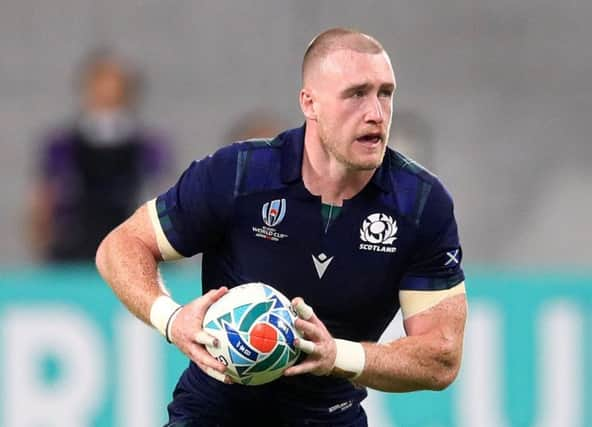Allan Massie: Stuart Hogg can lead Scotland from the back


The case for having a captain in the scrum is obvious; he is saying “come on” rather than “get on”. There’s a drawback today however. It’s rare for a front-row forward to be on the field for the full 80 minutes, and I’m old-fashioned enough to dislike the sight of a captain being called off, at least until a match has been well and truly won.
Well, assuming he avoids injury, Stuart Hogg ought to be there for the duration of the match. Some say full-back is too far from the action, especially these days when some captains seem to be chirping in the referee’s ear all the time. But I can’t see Hogg being loath to give the ref the benefit of his opinion. In any case we have had a good many full-back captains with notable victories to their credit: Angus Cameron, Ken Scotland, Stewart Wilson, Andy Irvine and Gavin Hastings.
Advertisement
Hide AdAdvertisement
Hide AdGregor Townsend’s squad for the opening match, or perhaps first two matches, of the Six Nations doesn’t offer such a radical change as Fabien Galthie’s French selection which sees six or seven experienced players being told “time’s up” at least for the moment, but it is certainly a nod to the future. This is, of course, partly because Greig Laidlaw, John Barclay and Tommy Seymour had already announced their retirement from international rugby. That said, the line-up for the opening game in Dublin will surely show few surprises – depending, of course, on fitness. Neither Jamie Ritchie nor Magnus Bradbury, two of our likely back-row, are available for Edinburgh against Agen this afternoon.
Glasgow gave their best performance of the season against Exeter last weekend, but one can’t really say they were unlucky to get no more than a draw. Arguably the foul which cost Callum Gibbins a yellow card cost Glasgow the match, since Exeter scored two converted tries while he was off the field. Of course, teams often play ten minutes with only 14 men and escape damage. Last weekend indeed Saracens were down to 14 for 75 minutes of their Champions Cup match, and reduced to 13 for another ten; yet still won. Their opponents that day, the Ospreys, aren’t, however, nearly as good a side as Exeter.
Mathematically Glasgow can still just reach the quarter-final. Unfortunately, no matter how well they do, survival depends on other results going their way.
Nevertheless a win at Sale, even one without a bonus point, would set them up nicely for the league matches to come. The return of Leone Nakarawa should give them a boost, even if, in his first match since Fiji’s elimination from the World Cup, he may not last beyond the hour mark.
The news that Richie Gray will be back with Glasgow next season goes some way to compensate for brother Jonny’s departure to Exeter, even though they are rather different sorts of player. Richie has been afflicted by injuries and when I have seen him playing for Toulouse has seemed to have lost a bit of the pace that made him such an exhilarating player but he will surely bring not only experience but some dynamism to Glasgow, while also, one supposes, being a player from whom the very impressive Scott Cummings will learn. Moreover, his return lifts some of the gloom occasioned by the successive departures of Finn Russell, Hogg, and Jonny Gray, the feeling that Glasgow were in danger of losing both the ambition and the ability to compete at the highest level of the club game. If only they can persuade Nakarawa to extend his short-term contract for at least a year…
Victories for both Glasgow and Edinburgh today would put us in good heart for the Six Nations, even doubtless to the extent of inducing that excessive or ill-founded optimism that surges at this time every year. One will look more closely at our prospects nearer the time, but optimism should be checked by an awareness of just how hard it is to win away from home and how seldom we manage to do so.
We like to think of Murrayfield as a fortress, though it was one which fell to both Ireland and Wales last season, but the Aviva Stadium really has been an impregnable fortress in the Six Nations for years, and, if Scotland’s World Cup failure gives us an added incentive to confound the critics this season, the same may be said of Ireland. Indeed, given their hopes and expectations their failure in Japan was every bit as disappointing as ours.